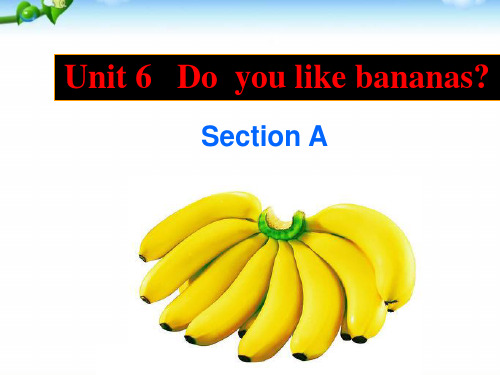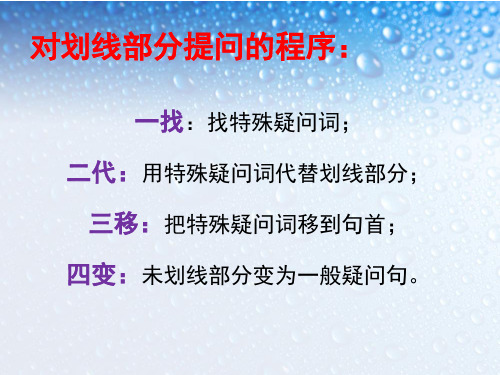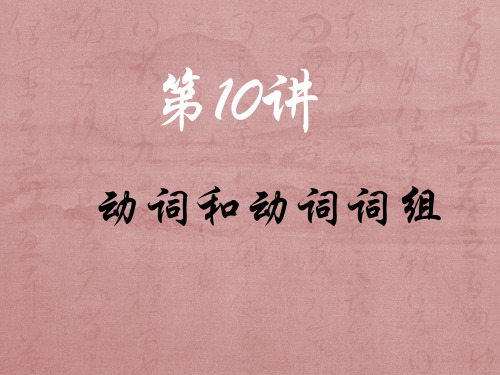助动词DO的讲解课件
合集下载
《一般现在时讲解》课件

一般现在时可以用来描述当前的情况或状态,例如“我现在很开心”、“她现在 是一名学生”等。这种时态强调的是当前的情况或状态,而不是过去或未来的变 化。
表示客观事实或普遍真理
总结词
描述不受时间影响的客观事实或普遍真理。
详细描述
一般现在时可以用来描述不受时间影响的客观事实或普遍真理,例如“地球是圆的”、“水在100摄氏度下沸腾 ”等。这种时态强调的是事实的普遍性和客观性,不会因为时间而改变。
I eat an apple every day. (我每天吃 一个苹果。)
结构
一般现在时的基本结构是“主语+谓 语+(宾语)+(其他成分)”,其中 谓语动词以原形或第三人称单数形式 出现。
一般现在时的特点
01
02
03
强调现在
一般现在时强调当前时间 点,表示动作或状态正在 发生或存在。
普遍性
一般现在时用于描述普遍 存在的真理、事实或习惯 性行为,不受时间限制。
总结词
动词形式不同
详细描述
一般现在时的动词形式为原型,而一般将 来时的动词形式需要用will+动词原型。
与现在进行时的对比
总结词
动作状态不同
详细描述
一般现在时表示现在的动作或状态,强调动作的持续性 ;而现在进行时表示正在进行的动作或状态,强调动作 的进行过程。
总结词
用法侧重不同
详细描述
一般现在时更侧重于描述习惯性、经常性的动作或状态 ,而现在进行时则侧重于描述当前正在发生的动作或状 态。
一般现在时的用法
表示习惯性或经常发生的动作
总结词
描述日常生活中的常见行为或习惯。
详细描述
一般现在时用于描述日常生活中的常见行为或习惯,例如“我每天早上起床” 、“他每周去健身房锻炼”等。这种时态强调行为的频繁性或习惯性,而不是 特定的一次性事件。
表示客观事实或普遍真理
总结词
描述不受时间影响的客观事实或普遍真理。
详细描述
一般现在时可以用来描述不受时间影响的客观事实或普遍真理,例如“地球是圆的”、“水在100摄氏度下沸腾 ”等。这种时态强调的是事实的普遍性和客观性,不会因为时间而改变。
I eat an apple every day. (我每天吃 一个苹果。)
结构
一般现在时的基本结构是“主语+谓 语+(宾语)+(其他成分)”,其中 谓语动词以原形或第三人称单数形式 出现。
一般现在时的特点
01
02
03
强调现在
一般现在时强调当前时间 点,表示动作或状态正在 发生或存在。
普遍性
一般现在时用于描述普遍 存在的真理、事实或习惯 性行为,不受时间限制。
总结词
动词形式不同
详细描述
一般现在时的动词形式为原型,而一般将 来时的动词形式需要用will+动词原型。
与现在进行时的对比
总结词
动作状态不同
详细描述
一般现在时表示现在的动作或状态,强调动作的持续性 ;而现在进行时表示正在进行的动作或状态,强调动作 的进行过程。
总结词
用法侧重不同
详细描述
一般现在时更侧重于描述习惯性、经常性的动作或状态 ,而现在进行时则侧重于描述当前正在发生的动作或状 态。
一般现在时的用法
表示习惯性或经常发生的动作
总结词
描述日常生活中的常见行为或习惯。
详细描述
一般现在时用于描述日常生活中的常见行为或习惯,例如“我每天早上起床” 、“他每周去健身房锻炼”等。这种时态强调行为的频繁性或习惯性,而不是 特定的一次性事件。
人教版七年级上Unit6_Do_you_like_bananas)课件

1. Write down the conversation(2c) between your and your partner.
2. Write a report according to the survey.
Unit 6 Do you like bananas
Aims and Language points:
2. -Let’s think about the food.
-Sure.
-让我们想想(吃什么)食物吧。 -当然。/没问题
think about “对…有(某种观点); 回想起;考虑”
Eg. You can think about it. 你可以把这事考虑一下。
Sure.
What do you think about him? 你觉得他这人怎么样?
中用助动词does。 疑问句和否定句中用到does后,谓语动词用原形(like).
Let’s chant
Join us, join us. Let’s have a party. Do you like salad ? Yes, I do. Do you like bread ? No, I don’t. Does he like apples ? Yes, he does. Does she like pears? No, she doesn’t. Do they like hamburgers? Yes, they do. I see. I see. Let’s have a party.
Do you like …?
Names
tomatoes
ice-cream
hamburger s
2a.Listen and circle the food. (Students’ Book Page 32)
新概念英语第一册47课ppt课件

课文讲解
• Do you like coffee, Ann? • Do you want a cup? • Do you want any sugar? • Do you want any milk? • Do you like biscuits? • Do you want one? • 请仔细观察这些句子,有何共同特
B: Yes, I do . No . I don’t .
2 . A: Do you want any sugar? B: Yes, I do .
No, I don’t .
Language Points
sth.
1.like to do sth.
doing sth.
sth.
2.want to do sth.
★wa nt
; 希望
v. 想
. want sth. 想 要 某 物
What do you want?
I want some tea .
want sb. to do sth. 想让某人做某事
. 妈妈想让我好好学习
. Mother wants me to study hard. . ② v. 需要
. My shoes want cleaning.
I don' t like milk in my coffee . I like black coffee .
Do you like biscuits? Yes . I do . Do you want one?
Yes, please .
Key Structures
1 . A: Do you like coffee?
Practice
•你喜欢 …吗? •Do you like…? •你想要…吗? •Do you want…?
初一英语上册Do_you_like_bananas课件

milk
ice cream
bread
salad
可数名词和不可数名词
可数名词 (1)定义:是可以计数的名词。 (2)可数名词前可以用 a , an 限定,表一个….。 (3)可数名词前可以用 one, two , three… 限定。 (4)可数名词有复数形式。
可数名词复数形式的构成 1
名词特点 词尾加法 词尾读音方法
tomatoes bread ice cream
oranges apples salad
bananas pears chicken
tea meat milk
Countable nouns 可数名词
hamburgers tomatoes
oranges bananas strawberries eggs apples
1c
编新对话
Do you like…?
Yes, I do. / No, I don’t.
2a Listen and circle the food you hear. 听录音,圈出所听到的食物。
hamburgers pears tomatoes
strawberries oranges ice-cream
Likes
Doesn’t like
salad, apples, bananas, orange, vegetables
ice-cream
Tom
carrots,
apples
1e Ask and answer questions
about what Sally and Tom like and don’t like.
No , they don’t .
Grammar Focus 2
2012-2013_人教新目标七年级上册课件Unit5__Do_you_have_a_soccer_ball__A_1a-2d

Listening 1b
Listen and circle the words your hear.
ping-pong bat volleyball
soccer ball ping-pong ball
Let’s read
Do you have a ping-pong bat?
1c
Yes, I do. I have a ping-pong bat. No, I don’t. I don’t have one.
Mike
Reading
Read the dialogue in 2d. Then match the things with the right places.
baseball
Helen’s baseball bat jacket hat We don’t know.
Pairwork
2d Role-play the conversation.
do—does aux. (助动词) 用于构成否定句 和疑问句:无词义。 v. 做,干 v. 有(某人有某物) have-has n. 球 ball ping-pong n. 乒乓球 n. 球棒;球拍 bat (英式)足球 football soccer ball n. 排球 注意:球类前面不加the. volleyball n. 篮球 play soccer basketball
Does Anna have a schoolbag?
No, she doesn’t. Anna
Listening
2a Listen and number the
things [1-4].
3
4
1
2
Listening
助动词PPT课件

一加二改三问号
23
Do exercises.
1.There is some water in the cup. 2.They are teachers. 3.I am working with numbers. 4.Lisa can make a kite. 5.She does homework every night. 6.They like swimming.
2
TWhhisatis’stishawtithsdhiaiscs?tt.?.ionary. 一找:对物体进行提问用what 二代:用what代替划线部分 三移:把what放在句首 四变:把this is 变为一般疑问句
3
TWhheajtacokleotristishwretehdjea. ctjakcceoktloeistr.?. 一找:对颜色进行提问用what color 二代:用what color代替划线部分 三移:把what color放在句首 四变:把the jacket is 变为一般疑问句
一找:对年龄进行提问用How old 二代:用how old代替划线部分 三移:把how old放在句首
四变:把the boy is变为一般疑问句
6
• 关于特殊疑问词组
• 针对人提问 (谁)
who
• 地点(何地) where
• 时间(何时)
when what time
• 方式方法程序(怎样) how
4
TWhheebroe’ortakherseethabtaehroreobekwobusohnkaoesdkrr?ese?.r. the bed. 一找:对地点进行提问用where 二代:用where代替划线部分 三移:把where放在句首 四变:把the books are变为一般疑问句
23
Do exercises.
1.There is some water in the cup. 2.They are teachers. 3.I am working with numbers. 4.Lisa can make a kite. 5.She does homework every night. 6.They like swimming.
2
TWhhisatis’stishawtithsdhiaiscs?tt.?.ionary. 一找:对物体进行提问用what 二代:用what代替划线部分 三移:把what放在句首 四变:把this is 变为一般疑问句
3
TWhheajtacokleotristishwretehdjea. ctjakcceoktloeistr.?. 一找:对颜色进行提问用what color 二代:用what color代替划线部分 三移:把what color放在句首 四变:把the jacket is 变为一般疑问句
一找:对年龄进行提问用How old 二代:用how old代替划线部分 三移:把how old放在句首
四变:把the boy is变为一般疑问句
6
• 关于特殊疑问词组
• 针对人提问 (谁)
who
• 地点(何地) where
• 时间(何时)
when what time
• 方式方法程序(怎样) how
4
TWhheebroe’ortakherseethabtaehroreobekwobusohnkaoesdkrr?ese?.r. the bed. 一找:对地点进行提问用where 二代:用where代替划线部分 三移:把where放在句首 四变:把the books are变为一般疑问句
动词和动词词组 ppt课件

do 1. do通常用来协助主动词表示否定意义或构成疑问句
My wife doesn’t know Russian
Do you agree with me?
2.do用来加强语气,起强调作用 You do look well
3.do用作代词 ---Do you like Beijing? ---Yes,I do (do代替like Beijing)
Examples: 1. It may snow before nightfall.
2. Would you let me use your pen for a minute?
3.If she became a movie star, she could afford a new home.
注意:情态动词过去时形式并不一定就表示过去时间 情态动词不能叠加使用,其后接的是动词原形
第10讲
动词和动词词组
动词分类(一)
1,按其在动词词组中所起的作用分:主动词和助动词
{主动词: 又叫实义动词,能独立作句子谓语成分 简单动词词组 复杂动词词组 基本助动词:be,do,have
{ 助动词
情态助动词 can,could,may,might,will,would,shall,should,need, must,dare,dared,ought to,used to
半助动词:have to,seem to,be about to,be due to, be going to ,be meant to,be meant to,be supposed to等.
Examples: 1.The workers received a raise last year.
2.They have been taking music lessons.
My wife doesn’t know Russian
Do you agree with me?
2.do用来加强语气,起强调作用 You do look well
3.do用作代词 ---Do you like Beijing? ---Yes,I do (do代替like Beijing)
Examples: 1. It may snow before nightfall.
2. Would you let me use your pen for a minute?
3.If she became a movie star, she could afford a new home.
注意:情态动词过去时形式并不一定就表示过去时间 情态动词不能叠加使用,其后接的是动词原形
第10讲
动词和动词词组
动词分类(一)
1,按其在动词词组中所起的作用分:主动词和助动词
{主动词: 又叫实义动词,能独立作句子谓语成分 简单动词词组 复杂动词词组 基本助动词:be,do,have
{ 助动词
情态助动词 can,could,may,might,will,would,shall,should,need, must,dare,dared,ought to,used to
半助动词:have to,seem to,be about to,be due to, be going to ,be meant to,be meant to,be supposed to等.
Examples: 1.The workers received a raise last year.
2.They have been taking music lessons.
人教版六年级上册英语第五单元Unit 5 What does he do卡通简约ppt课件模板

Let’s talk
知识点 1 What does he do? 他是做什么的?
考向1: 询问人物职业的句子:一般问的是单个的人,所以主语
是第三人称单数。
基本句型:What does +主语(第三人称单数) +do?
其中does是助动词,显示主语的人称和数,后面的动词do是实义 动词,表示“做”的意思,用动词原形。
Let’s talk
Sarah: Is your father here today? Oliver: No. He’s in Australia. Sarah: What does he do? Oliver: He’s a businessman. He often
goes to other countries. Sarah: And what does your mother do?
二、单项选择。
Do you want ___B_____ a doctor one day?
A. to do
B. to be
C. be
点拨: want to be意为“想成为”。
三、下面哪个选项不能选?
He ____A____ to be a taxi driver in the future(将来).
Pair work
同桌结对,学生A拿一套家庭成员卡片,学生B拿一套职业卡片。 分角色朗读并表演对话。 学生A:What does your ... do? 学生B:He/she is a ...
PART 03
当堂检测
一、翻译句子。 我爱我的国家。 __I__lo__v_e__m__y__c_o__u_n__tr__y_. ___
例句:China is my mother country.
